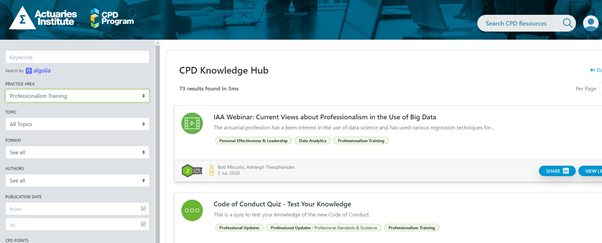A Code for all
As the end of the membership year approaches and Continuous Professional Development (CPD) points need to be accounted for, did you consider ethics training in your professional development? Are you aware of the content of the new Code of Conduct, which applies to all members?

Being aware of the Code’s content and practical applications could be some of the most valuable training you can get, and more than just ticking the CPD box, yet it is often overlooked. Though not as life or death as the Pirate’s code, it could affect the life and death of your actuarial career if not complied with.
A new Code is born
The Actuaries Institute introduced an updated Code of Conduct in March 2020. The Code of Conduct Taskforce reviewed professional and ethical codes of conduct for other professions and for overseas actuarial professions. Council agreed that a high-level principles-based Code, instead of a more prescriptive rules-based approach, would be appropriate. The final Code is similar to that of the UK Institute and Faculty of Actuaries (IFoA).
In the Code it states its purpose as: “The Code consists of principles which Members are expected to observe in the public interest and in order to build and promote confidence in the Services provided by actuaries and in the actuarial profession.”
The headline six principles are:
- Integrity: Members will act with integrity.
- Compliance: Members will comply with all relevant laws, regulations and Professional Standards.
- Competence and Care: Members will provide Services competently and with care.
- Objectivity: Members will conduct themselves such that their professional judgement and ability to provide objective advice is not compromised, and cannot reasonably be perceived to be compromised, by bias, conflict of interest or the undue influence of others.
- Speaking Up: Members will appropriately respond to non-compliance by others.
- Communication: Members will communicate appropriately.
The Code of Conduct document goes into more detail on the meaning of each of these principles. It can be found here along with more background to the code, and even a quiz you can count as a CPD point!

CPD and the Code
Understanding the Code of Conduct is an integral part of the CPD scheme, which states:
“The purpose of CPD is to ensure all Members maintain, improve and broaden their knowledge and skills, and to develop the personal and professional qualities needed for the provision of Services. As such, CPD is a significant component of the process whereby a Member maintains, or develops, his or her capacity to practise in accordance with the requirements of the Institute’s Code of Conduct and Professional Standards.”
From 1 January 2020 CPD must include at least five points from ‘Professionalism Training’ which is defined as:
CPD activity aimed to enhance a Member’s understanding of an actuary’s professional obligations which achieves one or more of the following objectives:
- enhance understanding of principles of professional behaviour and how to apply these in making professional judgements;
- enhance understanding of what it means to act in the public interest;
- equip Members to recognise professional or ethical dilemmas and make reasoned and justifiable decisions in resolving such dilemmas; and/or
- assist Members to demonstrate professional behaviour in practical situations, particularly those relevant to any Services they provide or intend to provide.
Members will need to verify they have met the requirement for the 2020 membership year in September 2021.
Professionalism Training
No doubt you will face ethical and professional issues during most days at work, perhaps without even realising it. So how can you obtain ‘Professionalism Training’?
There is the obvious attending of more ethics based talks at conferences or watching relevant webinars. You could also organise discussion groups at work to discuss ethical issues that may arise that cause conflict with the Code of Conduct – and if appropriate reflect on recent projects or scenarios that have arisen for people where they felt a conflict.
On the Institute’s CPD Knowledge Hub (accessible through “Search CPD resources” from your CPD Dashboard when you are logged in), material which has been identified as “Professionalism Training” is accessible by choosing that topic under the Practice Area search.

The Institute will also soon be providing members with access to the UK IFoA produced ‘Professional Skills Training’ videos. The series of short case study videos have scenarios acted out followed by some questions to consider after watching the scenario. This is most effectively done in discussion with others. Then a short video follows where two actuaries discuss these questions and the ethical issues arising and how they relate to the Code.
Each CPD year usually has a theme and there are seven years of video resources to choose from. The theme for 2019/20 was ‘A Trusted Profession’ and some of the scenarios covered were:
- The challenges of working in a multidisciplinary project team to implement a pilot using AI technology for insurance renewal pricing.
- Deputising for the CRO, you find yourself asked to give the go ahead on a project launch which you think may be outside the firm’s risk appetite.
- Under pressure from management to come up with a “best estimate” in an impossible time frame.
- Facing a tough decision on whether to blow the whistle.
- What level of information you need to disclose about your model to another professional who is relying on the results to formulate their advice.
We found the videos well made and thought provoking and an interesting way to get CPD points.

Summary
As Actuaries we usually pride ourselves on being ethical and professional and may feel we don’t need to be that familiar with the Code of Conduct (and may assume we know what it says anyway). But it is our moral duty as a member to take the time to read the Code and consider how it applies to the work we do and how we conduct ourselves. Maybe if we had the Code at the forefront of our minds in our decision making and actions we might do things a little differently, or have greater confidence that what we are doing is in line with what the Profession stands for.
The Code of Conduct is a good set of principles for all to follow in a company and not just actuaries, and so it is worthwhile promoting it to senior management and others. Perhaps by making our non-actuarial colleagues aware of the Code and our obligations to comply with it, we may help reduce some of the tricky ethical issues which we face before they arise.

CPD: Actuaries Institute Members can claim two CPD points for every hour of reading articles on Actuaries Digital.






